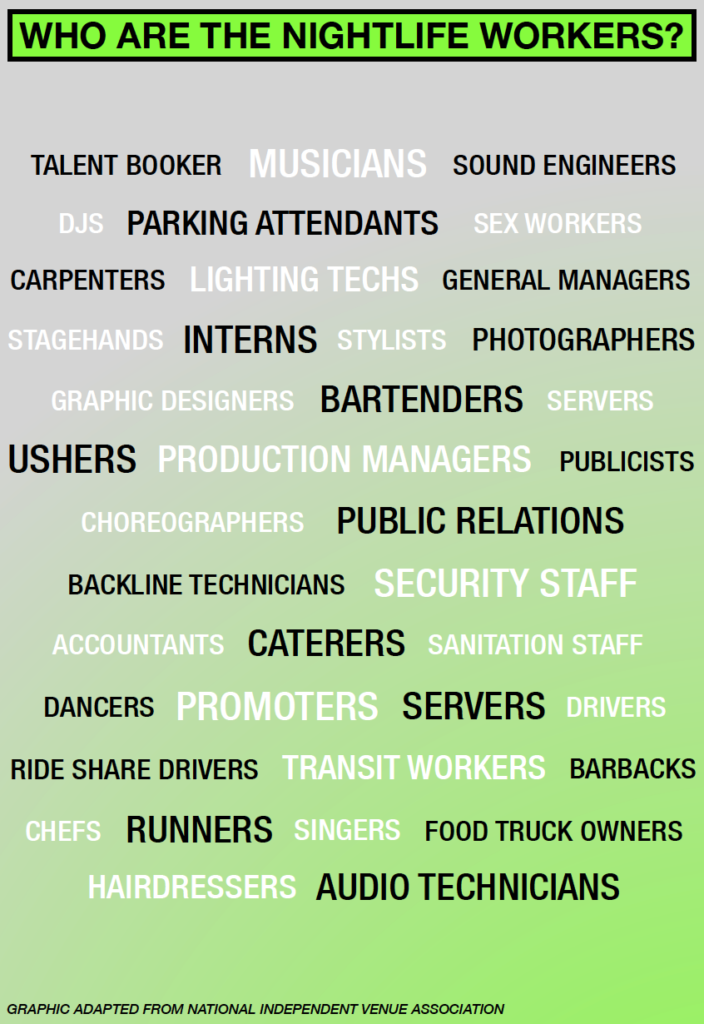popn’politics: Global Perspectives on Night-time Recovery
Listen back to the workshops and panels we hosted for Reeperbahn festival that explore what is next for nightlife.

Since March 2020, nightlife has come to a complete standstill around the world. Clubs, bars and spaces remain closed—people and communities working in nightlife are patiently awaiting the green light for reopening. While cities are slowly changing and relaxing regulations, we must ask ourselves: Where next for nightlife? How can night-time stakeholders, decision makers and cities meaningfully support people and communities working in nightlife going forward? What does recovery look like for the creative and cultural night-time sectors?
On May 7th 2021, night-time research and advocacy consultancy agency VibeLab partnered with Reeperbahn Festival, and presented: pop’n’politics: Global Perspectives on Night-time Recovery with the support of the Federal Agency for Political Education in Germany. Drawing on insights and synergies from VibeLab’s seven-chapter Global Nighttime Recovery Plan, the conference kicked off with two workshops, followed by a panel discussion and the announcement of VibeLab’s Global Nighttime Recovery Manifesto.
It goes without saying that the COVID-19 pandemic has profoundly affected all aspects of life in the city. From strict social distancing measures, to government-imposed curfews, to operating closures of businesses in urban areas—the last year-and-a-half has revealed some fundamental failures in how we plan, design, live and work in cities—while exacerbating the concurrent nature of many pre-existing and ongoing urban crises.
Source: Global Nighttime Recovery Plan (2021)
While this global crisis has impacted us all differently, the livelihoods of people and communities that depend, work, and operate in nightlife have, for the most part, been completely devastated. With the outbreak of the novel coronavirus in December 2019, and in an effort to curb its spread, many governments’ immediate response has seen the closure to arts, cultural and nightlife establishments that underpin and support people and communities at night across cities worldwide. With immediate effect, nightlife workers have seen their incomes dry up; many have been struggling to afford rent and/or support their dependents, while managing their mental health—and many have inadvertently been left with no other option but to find income through different means to get by. The impacts of COVID-19 on the creative and cultural sectors has not only exposed the vulnerability of nightlife workers in and of itself, but is a testament to these contemporary failures of urban life as we once knew it. The full picture of the pandemic’s lasting imprint on those working in nightlife will only become clearer once we get out on the other side.
Recent weeks have demonstrated that we can get back to normal, however the concern here is if normal is what we should be returning to? When discussing ‘night-time recovery’—our fundamental and shared concern should be: How can we meaningfully prioritise, centre and uplift people and communities most in need of support? Not only with immediate effect, but also in building capacity for future global crises—while addressing systemic inequities and endemic injustices. A new precedent must be agreed upon, and it is incumbent that the plethora of urban actors involved in managing the city at night should unite in striving towards a more resilient, sustainable and equitable future for those working in nightlife.
In the bid to address these proliferating questions, on May 7th 2021, night-time research and advocacy agency VibeLab partnered with Reeperbahn Festival, and presented: pop’n’politics: Global Perspectives on Night-time Recovery with the support of the Federal Agency for Political Education in Germany. Drawing on insights and synergies from VibeLab’s seven-chapter Global Nighttime Recovery Plan, the two-day conference kicked off with two workshops, followed by a panel discussion and the announcement of VibeLab’s Global Nighttime Recovery Manifesto.
Workshop 1: The future of safe(r) and equitable nightlife spaces: Supporting women, communities of colour, marginalised and underrepresented communities in the night—co-led by Lewamm Ghebremariam (Change.org and Berlin Club Commission), Lo Marshall (University College London), and Tara Duvivier (Pratt Center for Community Development) explored how different stakeholders can leverage their position, privilege and power to support and empower marginalised and underrepresented groups at night, how research on LGBTQIA+ communities and nightlife spaces can empower communities while meaningfully informing urban policy and action, and its blindspots, and how nightlife workers can galvanise state support through collective action.
The insights from this workshop are documented in this graphic recording, and you can watch the workshop below:
Workshop 2: The future of nightlife: Liberty, data, and technology—co-led by Michael Fichman (PennPraxis), and Mark Adam Harold (Vilnius Night Alliance) explored how research, data and technology can meaningfully inform night-time stakeholders, decision makers and cities in best supporting people and communities working in nightlife in aiding night-time recovery.
The insights from this workshop are documented in this graphic recording, and you can watch the workshop below:
A panel discussion on the ‘future of night-time recovery’ brought together a diversity of different night-time advocates, experts and leaders including, Juma Assiago (Global Safer Cities at UN Habitat), Sheena Jardine-Olade (Canadian Institute for Planners and Night Lab), Helen Sildna (Tallinn Music Week), Alexander Ostermeier (#AlarmstufeRot), Lutz Leichsenring (VibeLab), and was moderated by Torsten Groß (Rolling Stone Magazine Germany).
You can watch the panel discussion below:
The insights from pop’n’politics: Global Perspectives on Night-time Recovery are the first steps in VibeLab’s forthcoming project entitled, The Global Nighttime Recovery Manifesto. The manifesto seeks to offer night-time communities, stakeholders, and governance bodies a roadmap for working towards a more resilient, sustainable and equitable future for people and communities in the night across the world. Over the next several months, VibeLab is seeking to collaborate with partners in making this manifesto a reality. Please register your interest in collaborating with VibeLab by contacting us at: hello@vibe-lab.org
